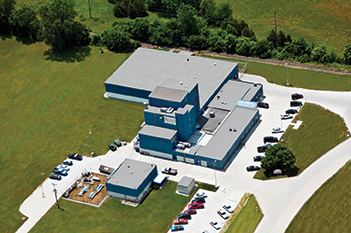 |
|||


|
 |


|
|

Allied Blending offers cost-effective, premium cheese ingredient solutions
Range of R&D facilities provides customer edge
Editor’s note: Welcome to Ingredient Innovation, CMN’s new segment exploring recent innovations and trends in the dairy ingredients sector. For this segment, we will profile a leader in the ingredients industry as well as share updates on mergers and acquisitions and new offerings for cheese and dairy in ingredients — where flavor begins.
By Alyssa Mitchell
|
Photo courtesy of Allied Blending |
| CUSTOMIZED INNOVATION — Each of Allied Blending’s facilities have the capability to produce its full product line — providing geographical freight benefits for customers — but each specializes in a certain area. The original facility in Keokuk, Iowa, pictured above, was established as a blending facility in 1984 and today houses bakery evaluation equipment. |
 |
| Photo courtesy of Allied Blending |
| DAIRY RESEARCH CENTER — Allied Blending further amplified its business in 2011 with the creation of a Dairy Research Center in St. Louis. The center contains a cheese manufacturing pilot facility for customer use as well as internal product development. |
KEOKUK, Iowa — From its beginnings as a small food ingredients distributor in the 1980s to the multi-dimensional manufacturing enterprise that exists today, Iowa-based Allied Blending LP is positioned as a key provider of value-added food blends and a diverse range of functional products for specialty food manufacturers.
The company began in 1981 when Peter Brooks and Charles Carvette, both salespersons, decided to start their own enterprise selling starch-based products manufactured in Keokuk, Iowa. The business evolved to service multiple starch-based markets, and, as it grew, Allied Blending became its own manufacturer of products with the addition of a blending facility in Keokuk in 1984.
In the late 1990s, Allied Blending introduced a starch-based shredded cheese anti-caking agent under its Free Flow brand. The product was designed as an alternative to the then industry standard cellulose-based product.
Dan Johnson, director of dairy sales, Allied Blending, notes that the company is always working to stay ahead of current and future trends. At that time, Allied Blending had developed an alternative starch-based anti-caking agent that delivered a superior appearance of the shredded cheese in packaging as well as an improved mouthfeel.
“Starch-based products perform similarly to cellulose-based products but also offer additional enhancements to the consumer while still bringing benefits to the manufacturer,” Johnson says.
He adds this product has continued to evolve, with the current fifth generation product the anti-caking agent of choice for shredded, cubed and grated cheeses.
“Everything we do is based in food science,” Johnson says. “We’re always looking to enhance or improve those products for both the manufacturer or consumer.”
Allied Blending’s newest starch-based anti-caking agent, Free Flow XF, provides value to the manufacturer as it eliminates the need to gas flush while still providing the same antimycotic and oxygen scavenging options standard in the Free Flow line.
The company also offers EconoFlow, a corn starch-based anti-caking solution at an economical price, and HyFlow, a cheese anti-caking agent specifically designed for gusseted bags that allows manufacturers to increase line speeds and reduce downtime, Johnson notes.
Allied Blending also offers FloAm Dairy, ideal for shredded, cubed and crumbled cheeses. This product is natural, dairy-based and non-GMO, lending itself to a clean label ingredient application, Johnson says.
• Expanded product line
Through strategic acquisitions over the years, Allied Blending has acquired additional products and facilities to better serve today’s cheese manufacturers.
The company acquired a line extension in 2003 through Kineva Foods. In 2005, Allied Blending established a facility in Bell, California, with the purchase of Ingredients Unlimited, and a preservative facility, Del Rancho, in Texas. The two facilities merged to today’s state-of-the-art facility in Bell, California, which was expanded to include full manufacturing capabilities aligned with the plant in Iowa.
The California facility has full capabilities to produce all Allied Blending products and also has a specialized blending unit that is certified to USDA 3-A Sanitary Standards, Johnson says, noting there are no similar blending facilities on the West Coast.
In 2011, Allied Blending further amplified its business with the creation of its patented casein-free analogue cheese products under its Cheese-Mor label and the creation of a research and development Dairy Research Center in St. Louis. The center contains a cheese manufacturing pilot facility for customer use as well as internal product development.
“These blends have led to a wide range of product characteristics for stretch, melt and appearance,” Johnson says. “Applications range from salad bar varieties to meat inclusions to individually wrapped slices to cheese blocks for shredding. More recently, we have focused on plant-based cream cheeses, dips, dressings and sauces.”
He adds that plant-based products are a major growing trend in cheese and dairy today, as well as other food types. Clean label and non-GMO also are a priority among consumers and Allied Blending’s customer base.
“Our products are designed to incorporate those qualities across a wide spectrum of applications,” Johnson says.
“The clean label trend eliminates ingredients with unfamiliar or chemical sounding names,” he adds. “Natural based preservative systems are becoming more popular despite their increased application costs. Health-conscious consumers will select these products over others, even at the higher price point.”
• Cutting-edge R&D, customization
All of Allied Blending’s offerings are backed by state-of-the-art facilities, R&D and high-quality manufacturing and safety standards. The company is certified organic, Safe Quality Food, USDA 3-A, kosher, halal, SEDEX and gluten-free.
“These certifications confirm our commitment to food safety and quality,” Johnson says. “Our allergen cleaning procedures assure our customers that if their product must be allergen-free, it is.”
He adds specialized products for focused groups such as lactose intolerant, Celiac disease, organic or kosher can be accomplished when needed with confidence.
Allied Blending also offers customization of its anti-cake blends, allowing for antimycotics, oxygen scavenging systems, non-GMO and clean label options.
“Our analogue products are customized for physical properties such as melt, stretch, cubing, shredding, slicing and dicing,” Johnson says. “They can also be used as an extender with natural cheese when required for specialized applications in bakery and meat. These products are designed to use our customers’ existing equipment.”
He adds that as food manufacturers continue to modify their offerings and create new products that meet emerging consumer demands, flexibility is key.
“Flexibility to change direction quickly, and, when possible, retain existing packaging labeling, can mean the difference between a product launch success or failure,” Johnson says. “Allied Blending is always there to support the manufacturer with technical expertise and customization of our products in extremely short time frames.”
With its facilities in southeast Iowa, southern California and St. Louis, the company has R&D capabilities and experts on hand to service customers in various locations throughout the United States.
“All of our dairy market products are supported with introductory plant trials at customers’ facilities as well as ongoing technical support from our food scientist group,” Johnson says. “Allied Blending has always focused our R&D on customer requested solutions driving our products’ value-added qualities.”
Johnson notes each of the company’s facilities have the capability to produce its full product line — providing geographical freight benefits for customers — but each specializes in a certain area.
The St. Louis facility specializes in cheese, while the facility in Keokuk houses bakery evaluation equipment, and the Bell facility has a Tortilla Innovation Center with a commercial tortilla line operating within.
“This permits ‘plant-expected’ results versus laboratory prototypes when developing or researching a customer’s product,” Johnson says, adding this can save significant time between when Allied Blending provides a product to a customer and when that product is ready for market.
“Usually competitors have the customers testing products on their own line, so the lead time goes from a couple weeks to possibly a couple months because of all the testing going back and forth,” he says. “We do the testing on our end, so these products are typically ready for the market.”
Looking ahead, Allied Blending will continue its tradition of looking at market trends — both in the United States and abroad — to stay ahead of the curve and offer its customers the latest in ingredient innovation and quality, Johnson says.
“We’re always looking at the next greatest thing to bring to the marketplace,” he says.
CMN
| CMN article search |
|
|
© 2025 Cheese Market News • Quarne Publishing, LLC • Legal Information • Online Privacy Policy • Terms and Conditions
Cheese Market News • Business/Advertising Office: P.O. Box 628254 • Middleton, WI 53562 • 608/831-6002
Cheese Market News • Editorial Office: 5315 Wall Street, Suite 100 • Madison, WI 53718 • 608/288-9090
